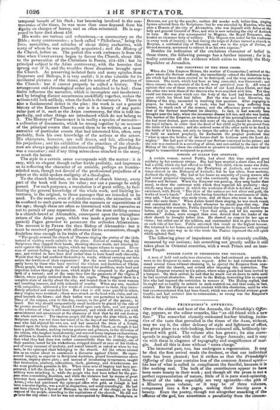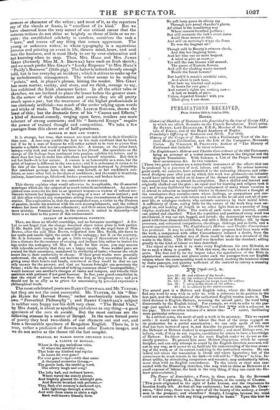FRIENDSHIP'S OFFERING.
ONE of the oldest and best of the Annuals, the Friendship's Offer- ing, appears, as the editor remarks, like "an old friend with a new face." The somewhat clumsily-embossed leather binding, imita- tive of the taste that prevailed in the times of the ALDI, without, may we say it, the older delicacy of style and lightness of effect, has given place to a rich-looking, fawn-coloured silk, brilliantly im- pressed with gold. The volume also has grown ; its size corre- sponds in magnitude with that of the larger Annuals; and it may vie with them in elegance of topography and magnificence of mar- gin. And all this is done without " extra charge." The immortal part, too, has undergone a regeneration. It may be that the first arrival reads the freshest, or that our individual taste has been pleased; but it strikes us that the Friendship" Offering of this year contains less of the common Annual spirit-- i has less of what is called in compliment the fanciful, because •it s like nothing real. The bulk of the contributors appear to have been more hearty in their work ; and though all the prose is sot • perfect representation of nature, little of it is pure word-spinning. Several of the tales especially are very agreeable—the pith of a Minerva press volume, or it may be of three volumes, compressed into a few pages, making their brevity seem a beauty. Even the poetry, though not altogether smacking of the afflatus of the god, has sometimes a peculiarity from the einem-
stances or character of the writer ; and most of it, as the reporters gay of the viands at feasts, is " excellent of its kind." But we have observed from the very outset of our critical career that the veteran writers do not shine so brightly as those of little or no re- pute: the established celebrity is careless, considers the task a n bore," and tosses off any thing that comes uppermost. The
young or unknown writer, to whom typography is a mysterious process and printing an event in life, throws mind, heart, and soul into the business, and is most likely to err by over-elaboration and sot knowing when to stop. Thus, Mrs. HALL and Mrs. JAMES GRAY (formerly Miss M. A. BROWNE) have each an Irish sketch ; and we much prefer Mrs. GRAY'S " Lucky Sixpence " to Mrs. HALL'S "Paddy's Bonneen" (little pig). The latter is indeed cleverly enough told, but is too everyday an incident; which it strives to make up for by melodramatic management. The writer seems to be making " points," and, in player's phrase, hitting the reader. Mrs. GRAY has more matter, variety, and story, and we think, strange to say, has exhibited the Irish character better. In all the other tales or sketches, we are inclined to place the lesser before the greater stars. In the nature of their characters and events they are all pretty much upon a par • but the treatment of the higher professionals is too obviously artificial—too much of the writer relying upon words and tricks of trade. The editor, Mr. LEITCH RITCHIE, shows the least of this ; but the dramatic form of his " Causes and Effects," a kind of' Annual comedy, verging upon farce, renders one more tolerant of strong contrasts ; and his " Immoral Essays" require the power of trained thought and composition. We take a few passages from this clever set of half-paradoxes.
HONOUR IN MEN AND WOMEN.
It is strange, but true, that women are more indelicate in their friendship than men. A man may confide the fact to his male confidant that he loves, but if he be a man of honour he will rather submit to be torn to pieces than breathe a syllable that would compromise her. A woman, on the other hand, betrays every look and word of her lover to her friend. She speculates on the change of his feelings from sentiment into passion, exhibits his letters, and in short does her best to make him ridiculous and herself miserable. But this is not her fault—it is her nature. A woman is as honourable as a man, but the point of honour is different in the two sexes ; and it is so because it seems to be the fate of the human race to have their happiness destroyed by friendship. Her confidant perhaps loves the same man herself, or her confidant's con- fidant, or some other link in the chain of confidence; and theresult is treachery, jealousy, heartburnings, falsehood, broken promises, and broken hearts.
ORIGIN OF ILL-ASSORTED MARRIAGES.
This theory explains what would otherwise be inexplicable, the ill-assorted marriages which are the subject of so much imbecile astonishment. An accom- plished man commits his fate to an ignorant woman—a woman of refined sen- timents intrusts her happiness to the keeping of a man of mere instinct ; and all this often without any compulsion arising from circumstances of fortune or station. The explanation is, that the accomplished man, a victim to the illusions of-passion, invests his mistress with his own accomplishments, and the refined woman her lover with her own refinement; and their union takes place through mere mistake. Personal beauty, in like manner, is united to deformity—iOr there is no limit to the power of this enchantment.
SECRET OF MATRIMONIAL CONTENT.
Then, are there no blissful courtships, and no fortunate marriages? A few. Let us not forget that the change described above takes place in both parties. If Mr. Smith still lingers in his moonlight walks with the angel form of Miss Brown after the said Miss Brown, vulgarized into Mrs. Smith, sits down to her cards and candle-light, the union will be unhappy ; but if, on the contrary, Mr. S. is fortunate enough to get a little twinge of rheumatism which gives him a distaste for the romance of evening, and inclines him rather to bestow his legs under the mahogany till Mrs. S. sends for him twice, you may assume with tolerable certainty that they are a happy couple. Some wedded pairs are praised for their constancy, occasioned by similarity of taste; whereas the whole secret lies in their conformity in change. If these great truths were generally understood, the single would not hesitate so long as they sometimes do about giving away their hearts and hands, convinced as they would be that we can only answer for the present, and that no human foresight can penetrate the future ; while the married, instead of talking nonsense about " incompatibility," would humour one another's changes of tastes and tempers, and trundle their assisters with patience if not good humour. In fine, your grand consolation is, that the object of your love was from the first an imaginary one ; and you should not be so silly as to grieve for ascertaining by personal experience a philosophical truth.
The most celebrated poets are BARRY CORNWALL and Mr. Tuprzs; but they are not the most successful. Mr. TUPPER, in his " Sim- ple Hymn for Harvest Home," rather mechanically imitates his own " Proverbial Philosophy "; and BARRY CORNWALL'S subject is neither very happy nor his drift very clear. " The Bridal Visit," by Mrs ABM., is about as sparkling and clever as any thing—a good specimen of the eers de societe. But the most curious are the following stanzas by a native of Bengal. In the more formal parts of poetry they beat two-thirds of our rhymers out and out, and form a favourable specimen of Bengalese English. There is, it is true, rather a profusion of flowers and other Eastern images, and we do not arrive at the theme till the last couplet.
STANZAS, BY BABOO GOVIN CHUNDER DLITT, A NATIVE OF BENGAL.
Where is the gay melodious voice, 0 where the mirthful tone, That bade my kindred soul rejoice In hours for ever gone ?
For ever gone !—a)e—with that name
A thousand memories throng,—
The gentle look, the soothing word, The silvery laugh and songl The lofty hall, and trelissed bower, Where waved the stately plume, And brightly glanced the midnight gem, And flowers breathed rich perfume,— They flash o'er memory's darkened eye,
Like lightnings through a storm, And with them starts to claim a sigh
Each well-known friendly form. No soft lamp pours its silvery ray Through you proud chamber's gloom, All silent is the mouldering way Where censers breathed perfume; But still resounds the lark's sweet notes Amid these scenes so fair, And still on morning's wings she floats To woo the fragrant air!
Though cold be Beauty's crimson cheek, And dim her laughing brow, And her blue eye no more bespeak
A mind as pure as snow,—
Yet still the rose blooms wild around, Thequeen of Eastern flowers, And still the clashing waves resound Beside the forest bowers!
But hush'd is music's mirthful voice, And silent is each tone, That bade my kindred soul rejoice In hours for ever gone !
And nature's sights are nothing now— A leaf, or breath of air— Unless, departed friends I with you Their glory I can share.



























 Previous page
Previous page